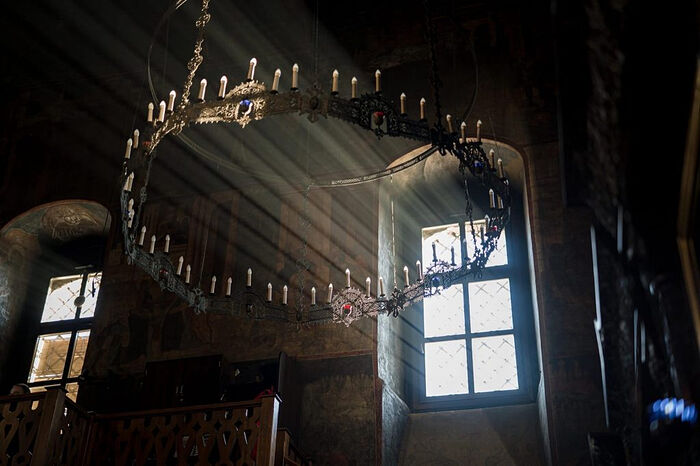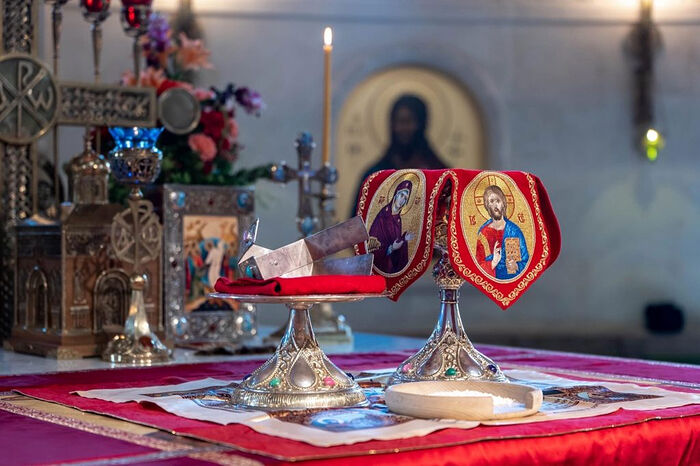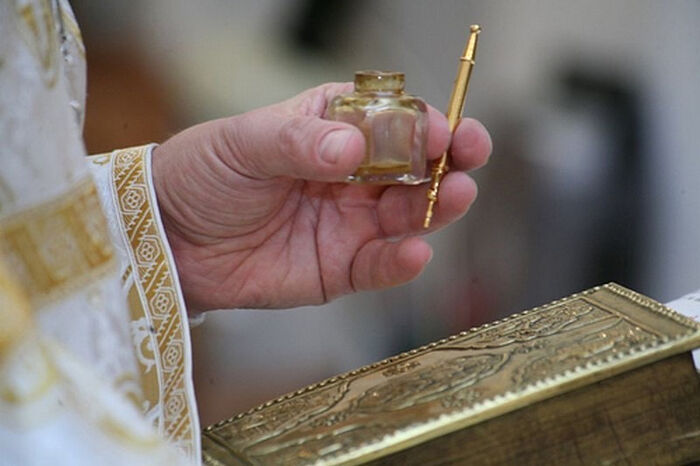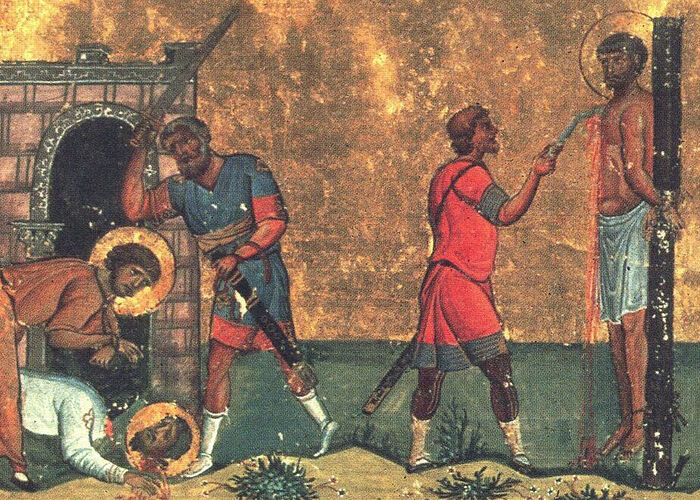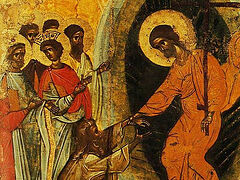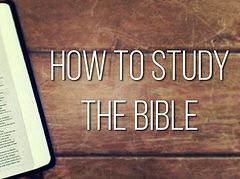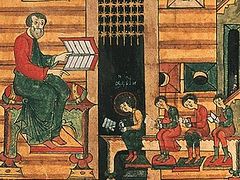A new project of the Spiritual-Educational Center of Sretensky Monastery on the study of Sacred Scripture, conducted by the well-known catechist Sergei Komarov, has begun. We will be discussing the book that begins the liturgical collection of the Apostolic epistles—the Acts of the Holy Apostles.
The book of Acts and the Holy Spirit
The book of Acts emphasizes the Divinity of the Holy Spirit as no other book. If in the books of the Old Testament we see the Holy Spirit as some kind of power of God, then in the New Testament books, especially in the book of Acts, the Holy Spirit is a Person, an Hypostasis: Тhe Spirit gave them utterance (2:4); we are His witnesses of these things; and so is also the Holy Spirit (5:32); the Spirit said unto Philip (8:29); the Spirit bade me go with them (11:12).
I wonder how the “Spirit said?” Was it a voice or an inner summons? This is an experience of talking to God, a mystical experience—God speaking with you. I think this happens in our lives too, we just don’t hear it. Take heed therefore how ye hear (Lk. 8:18), says the Savior. We have to have ears that are open to God.
The Bible has the concept of “circumcised ears” and a “circumcised heart.” This refers to spiritual sensitivity, a sensitive heart open to God. Recall how St. Stephen said in his last sermon to the Jews: Ye stiffnecked and uncircumcised in heart and ears, ye do always resist the Holy Spirit (7:51). That is, God speaks to people, but they don’t listen.
God speaks with us through the circumstances of life, through the words of friends, through books, through our thoughts. But because of coarseness and passionateness, even if we hear it, we don’t want to talk with Him. We want to talk to ourselves, to communicate with our passions and desires. Even when we seem to want to talk to God, deep down we don’t really want to hear, to listen to and obey Him. But God wants to talk to us. Fr. Andrei Tkachev wrote a book about this: God Has No One to Talk To.
There’s another remarkable section about the Divinity of the Holy Spirit. When St. Peter is speaking with Ananias and Sapphira, he says: Ananias, why hath Satan filled thine heart to lie to the Holy Spirit, and to keep back part of the price of the land? (5:3). And further in the next verse: Thou hast not lied unto men, but unto God (5:4). Thus, the Holy Spirit is God. By the way, that’s why a sin against the unity of the Church—schism—is a sin against the Holy Spirit. The Church is created by the Holy Spirit, and if you destroy what the Holy Spirit has gathered, has done, then that’s a sin against the Holy Spirit.
The former treatise have I made, O Theophilus, of all that Jesus began both to do and teach. The first book is the Gospel of Luke, also dedicated to Theophilus. The Gospel tells about all that Jesus began both to do and teach (1:1). I would like to draw your attention to two words here: “do” and “teach.” Christ did and taught. And the Church is the Body of Christ, it is Christ Himself. The Church continues the earthly life of Christ in a sense. It is also called “to do and teach.”
Christ preached, and the Church preaches. Christ healed the sick, and the Church heals the sick—both spiritually and bodily. Christ resurrected, and the Church spiritually resurrects, sometimes bodily. Christ was persecuted, and the Church will always be persecuted. Some listened to Christ, and there will always be some who listen to the Church. Christ was crucified, and in its inner essence, the Church is crucified for the world—it’s different from the world. Christ died and resurrected, and the Church too will one day become the Church Triumphant. Our earthly Church is called the Church Militant or Wandering, but the Heavenly Church, including the angels and souls of the saints, is the Church Triumphant. We are heading towards God, but they (departed Christians) have already arrived.
Christ did and taught, and that’s what the Church should do. And the Church is us. Christ is the Church, and the Church is us. We must love God, fulfill His commandments, help others, and somehow manifest our Christianity, and talk about the faith. The whole Church is called to preach the word of God in word and life. We should be missionaries to some degree.
The world is suffocating without God, without Christ, without grace; the world is going crazy, it is rotting. Who will tell people about God if not us? The Church is us, not just the clergy. And we must “do and teach.”
And further: …Until the day in which He was taken up, after that He through the Holy Spirit had given commandments unto the Apostles whom He had chosen (1:2). Christ gives commands to the Apostles by the Holy Spirit. The Holy Spirit is mentioned and it talks about the connection of the Persons of the Most Holy Trinity: Wherever Christ is, there is the Holy Spirit. Wherever the Holy Spirit is, there is Christ.
…To whom also He shewed Himself alive after His Passion by many infallible proofs (1:3). What kind of proofs are we talking about? Christ ate and drank in front of the Apostles and showed them His hands and feet pierced with nails. Sometimes they recognized Him, sometimes they didn’t—He sometimes appeared to them in other forms. All of this is the many infallible proofs.
…Being seen of them forty days, and speaking of the things pertaining to the Kingdom of God (1:3). Some commentators suggest that the conversation was about the structure of the Church, about how to administer it. After all, the Church is the Kingdom of God on Earth. But, apparently, Christ also reminded the Apostles of what He had earlier said about the Kingdom of God, and again revealed something about the Kingdom of God—now as the Resurrected Lord.
And, being assembled together with them (1:4), refers to the moment of the Ascension. Christ gathered the Apostles before the Ascension. He commanded them that they should not depart from Jerusalem. Jerusalem is the mystical center of Earth, the center of the whole of the history of the Gospel and the Old Testament. It is the city of the Prophets, the city of Christ, the city of the King of the Jews. This is the city chosen by God, where the key events of world history were to take place and still take place, according to the book of Revelation.
But wait for the promise of the Father, which … ye have heard of Me (1:4). In Christ’s farewell conversation with the Disciples in the Gospel of John (Jn. 14:16), He told them that the Spirit (another Comforter) would come in His place and remind them of everything He said.
For John truly baptized with water; but ye shall be baptized with the Holy Spirit not many days hence (1:5). The word “baptized” means immersion. The meaning is this: John immersed you in water, but you will be “immersed” in the Holy Spirit, and He will fill you.
The baptism of John didn’t forgive sins; it was a ritual washing that penitently prepared people for the coming of Christ. People came to St. John, went down into the water, and named their sins. As Tradition testifies, St. John preached to them about Him Who was to come after him—Christ.
St. John couldn’t cleanse sins because Christ hadn’t suffered yet. We have the purification of sins in the Church only because Christ took them on the Cross, blotting out the handwriting of our sins (Col. 2:14), but this didn’t exist yet during St. John’s lifetime. Therefore, sins couldn’t be forgiven in the sense in which we understand it now; they couldn’t be ontologically cleansed. The baptism of John was a preparatory penitential ritual ablution before the coming of Christ.
But the Apostles would be baptized with the Holy Spirit—this is something different. Our personal Pentecost today is Chrismation. We are also baptized with the Holy Spirit, of course, but God has provided another special Sacrament—the descent of the Holy Spirit upon us personally. Protopresbyter Alexander Schmemann writes in his book, Of Water and the Spirit, that when a priest chrismates someone who has already been baptized and says, “The seal of the gift of the Holy Spirit,” it means that the gift is the Holy Spirit; that we’re not talking about the gifts of the Holy Spirit, but about the Holy Spirit as gift.
It's interesting that Baptism isn’t enough—you also need Chrismation. In the second chapter, the Apostle Peter is asked: What shall we do? And he responds: Repent, and be baptized every one of you in the name of Jesus Christ for the remission of sins, and ye shall receive the gift of the Holy Spirit (Acts 2:38). This is about the two Sacraments of Baptism and Chrismation. Only, at that time, Chrismation took place through the laying on of hands by the Apostles. Later, the Church began to boil myrrh and anoint with it, but the essence of the Sacrament remains the same. The bishop lays his hands on the myrrh, and then, with the blessing of the bishop, we are anointed with it. This is a development that needs to be explained to someone coming to the Church today.
When they therefore were come together, they asked of Him, saying, Lord, wilt Thou at this time restore again the kingdom to Israel? (1:6). This is what interested the Apostles before they were enlightened by the Holy Spirit: political independence, the expulsion of the Romans. By the way, the thoughts of the Jews today are exactly the same as then: to take back the Promised Land and see the coming of the Messiah, who will be a political leader and deliver Israel from all enemies, driving out the Arabs.
But let’s not condemn the Apostles, because that’s how they were brought up and taught by the Scribes and Pharisees. And we’re exactly the same, because we also sometimes expect the Church to fulfill our various worldly desires. Sometimes we conceive of the Church as a generator of material assistance, as an attribute of religious comfort. Certainly not every Christian has the true motivation of life in the Church, which is the desire to be with God, to truly change your life, to be deified, to talk with God.
And He said unto them, It is not for you to know the times or the seasons, which the Father hath put in His own power. But ye shall receive power, after that the Holy Spirit is come upon you: and ye shall be witnesses unto Me both in Jerusalem, and in all Judaea, and in Samaria, and unto the uttermost part of the earth (1:7-8).
Christ said nothing to them about the times or a timeframe… Have you noticed that this often happens—they ask Christ a question, and He responds seemingly on another topic? Christ said many things to us, not to them—He spoke as if for later centuries , in advance, that we might understand how it was fulfilled.
He doesn’t even try to explain to the Apostles that His mission isn’t revolution, that His mission is the Spiritual Kingdom. They probably wouldn’t have understood anyways.
But ye shall receive power, after that the Holy Spirit is come upon you (1:8). That is, concentrate on this now, and you will understand everything later. And they really did understand, later, when the Holy Spirit descended upon them.
And ye shall be witnesses unto Me (1:8). The Greek word for “witness”— μάρτυρας (martiras)—is also translated as “martyr.” A martyr is a witness of Christ. The Lord as if says: “You will be My witnesses—martyrs.”
… Both in Jerusalem, and in all Judaea, and in Samaria, and unto the uttermost part of the earth (1:8). This indicates the spheres in which the Gospel will be preached: Jerusalem-Judea-Samaria—this is the national stratum closest to the Jews, while the uttermost part of the earth refers to the Gentile world. It was in this order that the Gospel was preached: Jerusalem-Judea-Samaria-Antioch, the first Gentile Christian community, and then the whole world. We will see this later in the book of Acts.

